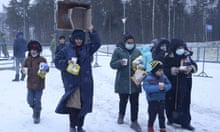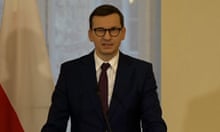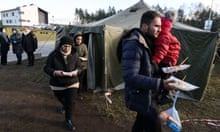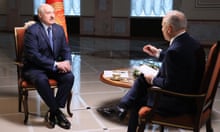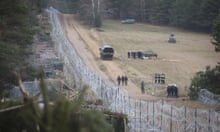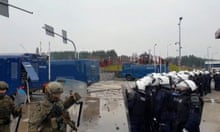For two days the same looped recording has been blaring out from speakers on the Polish border: “Attention! Attention! Crossing the Polish border is legal only at border crossings.”
The ominous warning is directed at the thousands of asylum seekers massed in Belarus on the opposite side of the barbed wire running between the two countries.
According to Poland, Belarus’s president, Alexander Lukashenko, is deliberately provoking a new refugee crisis in Europe by organising the movement of migrants from the Middle East to Minsk and promising them a safe passage to the EU in revenge for the sanctions Brussels has imposed on his authoritarian regime.

Nearly 20,000 Polish border police, flanked by military support, are now deployed in a show of force unknown in the country since the end of the cold war.
Until a few days ago, most migrants were violently pushed back, though some managed to make it to Warsaw after hiding out in the dense forests.
Since Belarusian authorities on Monday began escorting thousands of migrants to the Polish border in a dramatic escalation of an already deadly crisis, crossing the frontier has become even more difficult.
In the forests between the two countries, where night-time temperatures fall below zero, it is the thousands of Iraqi, Syrian and Afghan families who are now paying the price, scapegoats trapped between the violence of the Polish authorities and the false promises of the Belarus.
They live in small tents hidden between the trees, trying to keep warm in damp sleeping bags. At least eight people have died.
The Guardian met a group of three Iraqi Kurdish families from Duhok, including at least eight children, who had just crossed the border from Belarus.
Volunteers from Grupa Granica, a Polish Network of NGOs monitoring the situation on the border, reached them in the woods near Narewka before the Polish border police and – with the help of asylum lawyers – have so far prevented them from being pushed back to Belarus.
“We travelled for three days by car to Istanbul,” said a 40-year-old man, who said he had to leave the Iraqi governorate of Duhok for fear of retaliation by former Islamic State members in nearby villages.
He told an interpreter that from the Turkish city, they took a flight to Minsk, and once they reached the Polish border “the Belarusian police cut the barbed wire and let us through”.
The families had attempted to cross the border nine times before, being pushed back each time.
“Upon their arrival, the Polish border guards took them into a car and transferred them to the border patrol station,” said Anna Alboth from Minority Rights Group, an NGO.
“We try to monitor the situation, because from our past experiences the Polish police pushed back migrants even after taking them to a police station.”

Warsaw’s rightwing government has quadrupled the presence of border guards and military personnel in the area, creating a two-mile deep militarised zone and building a razor-wire fence.
There are dozens of checkpoints along the entire perimeter of the area. The soldiers stop every single car, to ask for documents and for the driver to open the boot.
In the streets around Sokòlka, about 12 miles from the border with Belarus, police trucks regularly whizz towards the secure zone, sirens blaring, while multiple helicopters monitor the scene from above.
“The situation is desperate and it’s getting worse,” said Kyle McNally, humanitarian affairs adviser for Doctors Without Borders (MSF).
“I have seen first-hand the injuries people experienced when assaulted by border guards from both Poland and Lithuania.
“People have described being beaten with the butt of a gun, kicked in the ribs, electrocuted in the neck, and have had all their belongings taken or destroyed by European border guards. This is unacceptable and must end now.”

According to MSF, one Syrian family slept in the forest on the Polish side of the border for 21 days before they were forced back.
The only assistance they received was by kind locals, at risk of their own safety. But the Polish authorities forced them back into Belarus where they now await an uncertain fate.
A text message sent by the Polish government to the phones of recently arrived travellers, warns that “The Polish border is sealed”, “Belarus told you lies” and “Go back to Minsk”.
The message – directed at asylum seekers, but being sent to most travellers in Poland who have recently completed a locator form – contains a link to a mysterious warning for the asylum seekers: “Do not take any pills or medications given to you in Belarus. You may be poisoned!”
Anna Chmielewska, from Ocalenie Foundation and coordinator of Help Center for Foreigners, based in Warsaw, said: “In early October, the Polish government told the press that the migrants were behaving strangely and that they believed they had been drugged or poisoned by the Belarus officers.
“We have no more information about this story, but to me, it sounds like fake news to make migrants look dangerous and Belarus look bad.”



